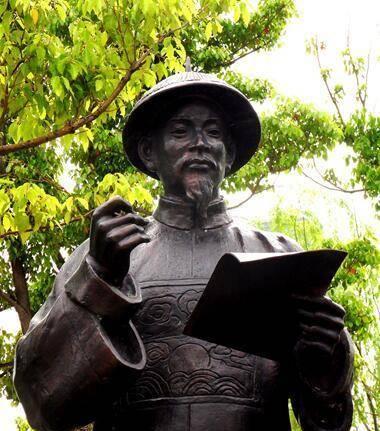Huang Yong/Wen
In the previous issue, we talked about the Qing Dynasty's Yuanhu Renyu, and this issue goes on to talk about another Zhuangyuan Hu Changling.
Legend has it that the name was good, and the Qianlong Emperor approved him as a champion
Hu Changling (胡長龄), courtesy name Xi geng (西庚), was a native of Tongzhou (present-day Nantong, Jiangsu). Today, there is also Hu Changling Zhuangyuan Mansion north of Tianning Temple in Nantong City.
In the 54th year of Qianlong (1789), Hu Changling won the first place in the temple examination and became a champion and served as a cultivator of the Hanlin Academy. However, regarding Hu Changling's examination of the middle title, there are legends that he is the luckiest champion because his name has been achieved well.
In the Yeshi "Qing Barnyard Banknotes", it is recorded that Hu Changling ranked 10th according to his results in the temple examination.
The imperial examination was presided over by the emperor himself, and the results had to be determined by the emperor. The Qianlong Emperor was 79 years old at the time, and when he saw Hu Changling's name, he was very happy and said, "Hu people are long-term!" ”
The Qianlong Emperor was the "Hu people" of the northern nomads, and the meaning of the name Hu Changling was exactly in line with his "Hu people" begging for a long life.
As soon as the Qianlong Emperor was happy, he designated Hu Changling as the first place. It is said that at that time, there were also good literati who wrote an article called "Hu Changling Won the Great Victory by His Name".

Statue of Hu Changling (file photo)
In the 56th year of Qianlong (1791), Hu Changling was promoted to the rank of acolyte and deputy examiner of the Wuhui Examination.
In the 60th year of Qianlong (1795), Hu Changling served as the guozi supervisor of the sacrificial liquor (the principal of the highest school of the Central Taixue School) and the chief examiner of the Shandong Township Examination. Later, Hu Changling became an official to the Rebbe Shangshu.
In the 19th year of Jiaqing (1814), Due to overwork, Hu Changling died on the way back to his hometown.
Hu Changling's struggle with the power-leaning Hezhen
Hu Changling was a clean and honest official, just and upright, and opposed the tendency to inflame and follow the trend. There are many legends about Hu Changling, such as his struggle with the powerful Hezhen.
It is said that according to the etiquette of the imperial examination, the jinshi are considered to be protégés of the prime minister of the dynasty and want to go to worship. After Hu Changling took the middle school entrance examination, he hated he was very disgusted with the law and greedy, so he did not go to worship and zhen.
He Yan was very dissatisfied, but Hu Changling was a new branch leader, and it was not easy to find his stubble, so he let Hu Changling go to work at the Hanlin Academy according to the regulations.
Working in the Hanlin Courtyard sounds good, but it is a department without oil and water, the salary is low, and Hu Changling is so poor that he hangs the pot as a gong.
One of his friends couldn't stand it anymore and wanted to secretly help him.
That year, when He Yan was doing shou, his friend used squid fish ink to imitate Hu Changling's words, wrote a pair of shou lian to give to He Yan, and explained to He Yan that Hu Changling was poor and sick, and did not even have a good dress, so he could not come to celebrate the birthday in person.
He Yan felt that Hu Changling had finally become smarter, stopped competing with him, and let Hu Changling go to Shandong to study politics.
Where did Hu Changling know that there were so many twists and turns behind it? But since the benefits have been given, we have to thank Hezhen. The friend wrote a thank you note in squid ink and sent it to Hekun's mansion when he was not at home.
Later, when He Yan fell, when raiding his home, he found that most of the imperial court ministers had contacts with He Yan, but there was no piece of paper from Hu Changling.
It turned out that the words written in squid fish ink would disappear on their own after a period of time. Is this statement true? I don't know, haven't tried, don't ask me.
It is said that because Hu Changling was not involved with Hezhen, the Jiaqing Emperor was very appreciative of him, and his officials gradually grew bigger, and eventually achieved the Rebbe Shangshu.
Love to read, every night to consume "candles a few inches"
Hu Changling's only hobby in his life is reading and reciting. At that time, there was no electricity, the lighting was by candles, and every night, he had to consume "a few inches of candles" to read.
Hu Changling prefers to read books on the history of the Bible, he is good at poetry, and his historical attainments are particularly profound. He was one of the "Three Juns of Jiangdong" (Hu Changling, Ma Youzhang, and Li Yizeng), and together with the Wang clan of Shanyang, he was known as the "Wang Jing Hu Shi", and wrote the "Manuscript of Hu Sanyutang".
【Next issue concern】
See hu (109).
【Special Thanks】
Mr. Hu Chuanhuai, an expert in literature and history of Pengxi County, Sichuan.
<b>[If you have a news thread, please report to us, once adopted, there is a fee reward.] Newspaper WeChat attention: ihxdsb, newspaper QQ: 3386405712].</b>